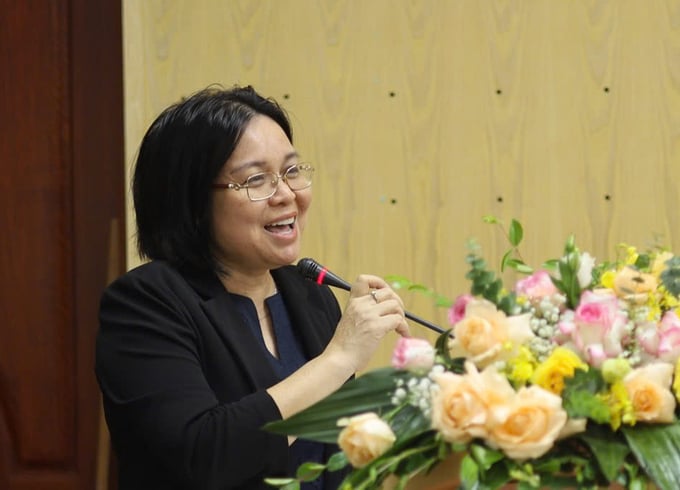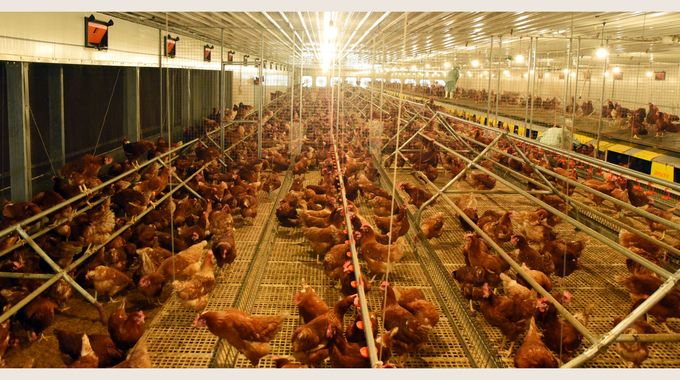November 24, 2025 | 23:15 GMT +7
November 24, 2025 | 23:15 GMT +7
Hotline: 0913.378.918
November 24, 2025 | 23:15 GMT +7
Hotline: 0913.378.918
The National Agricultural Extension Center, in collaboration with the Humane Society International (HSI), held a workshop in Hanoi on October 15 to connect businesses involved in animal welfare in Vietnam. The event provided an opportunity for government agencies and non-governmental organizations to discuss approaches to improving animal welfare in livestock farming.
During the event, the National Agricultural Extension Center and HSI discussed information and solutions to develop and expand animal welfare programs, implement clean egg production, and establish supply chains with local business communities.

According to Tham Thi Hong Phuong, Country Director of HSI/Vietnam, animal welfare in livestock farming fulfills corporate commitments and contributes to building a more humane future for the food industry. Photo: Phi Yen.
The livestock sector in Vietnam has seen significant growth over the years, with a focus on promoting animal welfare. With the aim of ensuring the quality of life for livestock populations, farmers must follow the "Five Freedoms" principle: freedom from hunger and thirst; freedom from pain, injury, and disease; freedom from discomfort (physical); freedom from fear and distress (mental); and freedom to express natural behaviors.
Commenting on the expansion of the cage-free egg production model, Le Thi Hang, Southeast Asia Regional Director of HSI, noted that consumer awareness regarding animal welfare has increased significantly in recent years. Accordingly, consumers have a growing demand for transparency from ethical farming systems. This shift in mindset has led to a strong movement toward this model, positioning Vietnam as a leader in Southeast Asia.
However, the cost of humane livestock farming is considerably higher than traditional farming practices due to the lower egg yield. Consequently, cage-free eggs command higher prices compared to those of standard farm eggs on the market. Without a suitable approach to consumers, customers may find it difficult to prioritize humanely produced eggs over similar products.
To develop the clean egg model and reach a wider consumer base nationwide, farmers must highlight the distinct benefits of cage-free eggs and communicate the humane farming practices behind the model, thereby allowing consumers to fully understand the true value of the product.

Consumers have a growing concern regarding animal welfare in livestock farming. Photo: VAN.
Several businesses have achieved relative success with the clean egg production model. Truong Chi Cuong, Deputy Director of Vinh Thanh Dat (V.Food), shared: "After switching to clean egg production, we were able to meet market demand, comply with global requirements, and improve animal welfare standards in Vietnam. V.Food is making an active effort to optimize clean egg production. Additionally, we plas to launch liquid clean egg products in the near future."
Modern industrial livestock farming is adopting more humane practices, where the economic benefits for farmers must closely associate with consumer interests, environmental protection, and animal welfare.
With the aim of developing toward international integration, Vietnam's livestock sector must incorporate animal welfare into training programs, research, and practical applications in production and society, thereby enhancing the value of livestock products and meeting export requirements.
According to the Vietnam Farms and Agricultural Enterprises Association (VFAEA), animal welfare refers to the treatment of animals, so that they are in the best physical and mental state, without unnecessary pain.
To avoid contaminating products from cattle and poultry with antibiotic residues and growth substances, livestock farmers should rear animals without cages and in a free environment based on their behavior. When livestock are not stressed, they will produce more productive and higher-quality meat and eggs.
Animal welfare, in addition to biosafety, also increases product value and brand value for the business community. San Ha, a pioneering business in the field of food production in Vietnam, is actively promoting the application of circular agriculture models and improving animal welfare in Vietnam.
"VFAEA has cooperated with Humane Society International (HSI), the world's leading animal protection organization, and San Ha Company, a pioneering business in the field of food production in Vietnam, to promote sustainable and ethical agricultural practices in Vietnam by combining the expertise and resources of the three organizations. This cooperation aims to bring the necessary knowledge and connections to implement circular agriculture models, improve animal welfare, and create a safer and more sustainable food supply for Vietnamese consumers," said Dr. Ha Thuy Hanh, Vice President of the VFAEA.
Translated by Nguyen Hai Long

(VAN) Green transition is crucial for the Mekong Delta amid climate change and stricter standards, offering a path toward sustainability.

(VAN) Dong Thap promotes agricultural restructuring, forms large specialized farming zones, raises the value of agricultural products and develops toward ecological and high-tech directions.
/2025/11/22/4018-4-213342_747.jpg)
(VAN) The Mekong Delta Agricultural Experts Club has attracted 143 experts and researchers to participate in providing consultancy and contributing initiatives to the development of one million hectares of high-quality rice.

(VAN) Ca Mau’s development of OCOP products opens a path to increasing cooperatives value, helping boost income, expand markets, and affirm collective economy's role.

(VAN) Turning seemingly ordinary coconut shells into unique jewelry and artwork, Nguyen Bang Nhi spreads the value of local culture through her brand, Cocohand.

(VAN) Results from the Sustainable Durian Model Project in Dak Lak have confirmed the critical role of Yara Viet Nam in transferring advanced nutritional solutions to farmers.

(VAN) In Tuyen Quang province, livestock farmers have introduced effective models and innovative practices that significantly strengthen African Swine Fever prevention and control efforts.